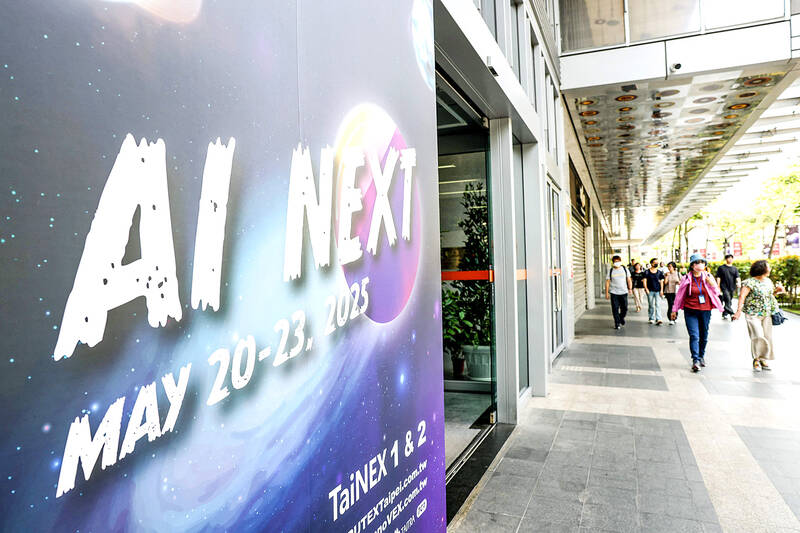Asustek Computer Inc (華碩) chairman Jonney Shih (施崇棠) yesterday said that artificial intelligence (AI) factories represent the next industrial revolution, which would require “light-speed” development, and emphasized the importance of AI server quality and reliability.
AI servers are now packed with large numbers of graphics processing units (GPUs) to maximize performance, such as floating point operations, and are pushing the limits of bandwidth, frequency and power design, Shih said in an online forum organized by Nvidia Corp.
“[The process] is incredibly painful, but Asus engineers love the challenge, [as] overcoming pain and bugs is a part of our DNA, and we enjoy the coengineering with Nvidia, which is indeed critical to scaling the AI factory,” he said.

Photo: AFP
At its annual GPU Technology Conference earlier this year, Nvidia announced partnerships with companies including Asustek and Dell Inc to launch its new DGX super AI computer series aimed at developers, researchers and data scientists.
Asustek’s AI strategy aims to integrate the technology across its operations — from the cloud and edge to PCs and end devices such as phones and robots to make AI more accessible, Shih said, adding that the company now has more than 2,200 service locations worldwide.
The company has also heavily invested in software development, including in the infrastructure and system platform layers, he said.
Asustek is to showcase its AI applications and gaming innovations at the annual Computex tech expo, which begins today and is to run through Friday at the Taipei Nangang Exhibition Hall.
Computex draws computer and chip companies from around the world to Taiwan, whose semiconductor industry is critical to the production of everything from iPhones to the servers that run ChatGPT.
Several other executives also participated in the Nvidia-organized forum, including Taiwan Semiconductor Manufacturing Co (台積電) executive vice president and co-CEO Y.J. Mii (米玉傑), Quanta Cloud Technology (QCT, 雲達) president Mike Yang (楊麒令) and Trend Micro Inc (趨勢科技) CEO Eva Chen (陳怡樺).
Yang said he has worked to understand Huang’s concept of an AI factory and to collaborate with internal hardware and software teams, adding that QCT’s AI factory is designed to turn people’s visions into reality.
Infrastructure is at the core of an AI factory, while open ecosystem partnerships are also key to meeting customer demands, he said.
QCT began working with Nvidia on the DGX series between 2014 and 2015, developed next-generation HGX servers together in 2021 and built AI servers for tier-one cloud service providers, Yang added.
QCT is to display its extensive product portfolio supporting Nvidia’s technologies to advance generative, agentic and physical AI at Computex.
Qualcomm Inc CEO Cristiano Amon announced yesterday that the company planned to expand into data centers, but did not elaborate.
Top executives from MediaTek Inc (聯發科) and Hon Hai Precision Industry Co (鴻海精密) are also to speak at Computex, where advancements in moving AI from data centers into laptops, robots and cars are in the spotlight.
Witology Markettrend Research Institute’s (智璞產業趨勢研究所) tech expert Paul Yu said the industry is at a “critical juncture” for AI hardware development.
“Over the past two-and-a-half years, significant investment has driven rapid advances in AI technology,” Yu said. “2025 to 2026 will be the crucial period for transitioning AI model training into profitable applications.”
Additional reporting by AFP

SEMICONDUCTOR SERVICES: A company executive said that Taiwanese firms must think about how to participate in global supply chains and lift their competitiveness Taiwan Semiconductor Manufacturing Co (TSMC, 台積電) yesterday said it expects to launch its first multifunctional service center in Pingtung County in the middle of 2027, in a bid to foster a resilient high-tech facility construction ecosystem. TSMC broached the idea of creating a center two or three years ago when it started building new manufacturing capacity in the US and Japan, the company said. The center, dubbed an “ecosystem park,” would assist local manufacturing facility construction partners to upgrade their capabilities and secure more deals from other global chipmakers such as Intel Corp, Micron Technology Inc and Infineon Technologies AG, TSMC said. It

NO BREAKTHROUGH? More substantial ‘deliverables,’ such as tariff reductions, would likely be saved for a meeting between Trump and Xi later this year, a trade expert said China launched two probes targeting the US semiconductor sector on Saturday ahead of talks between the two nations in Spain this week on trade, national security and the ownership of social media platform TikTok. China’s Ministry of Commerce announced an anti-dumping investigation into certain analog integrated circuits (ICs) imported from the US. The investigation is to target some commodity interface ICs and gate driver ICs, which are commonly made by US companies such as Texas Instruments Inc and ON Semiconductor Corp. The ministry also announced an anti-discrimination probe into US measures against China’s chip sector. US measures such as export curbs and tariffs

The US on Friday penalized two Chinese firms that acquired US chipmaking equipment for China’s top chipmaker, Semiconductor Manufacturing International Corp (SMIC, 中芯國際), including them among 32 entities that were added to the US Department of Commerce’s restricted trade list, a US government posting showed. Twenty-three of the 32 are in China. GMC Semiconductor Technology (Wuxi) Co (吉姆西半導體科技) and Jicun Semiconductor Technology (Shanghai) Co (吉存半導體科技) were placed on the list, formally known as the Entity List, for acquiring equipment for SMIC Northern Integrated Circuit Manufacturing (Beijing) Corp (中芯北方積體電路) and Semiconductor Manufacturing International (Beijing) Corp (中芯北京), the US Federal Register posting said. The

India’s ban of online money-based games could drive addicts to unregulated apps and offshore platforms that pose new financial and social risks, fantasy-sports gaming experts say. Indian Prime Minister Narendra Modi’s government banned real-money online games late last month, citing financial losses and addiction, leading to a shutdown of many apps offering paid fantasy cricket, rummy and poker games. “Many will move to offshore platforms, because of the addictive nature — they will find alternate means to get that dopamine hit,” said Viren Hemrajani, a Mumbai-based fantasy cricket analyst. “It [also] leads to fraud and scams, because everything is now